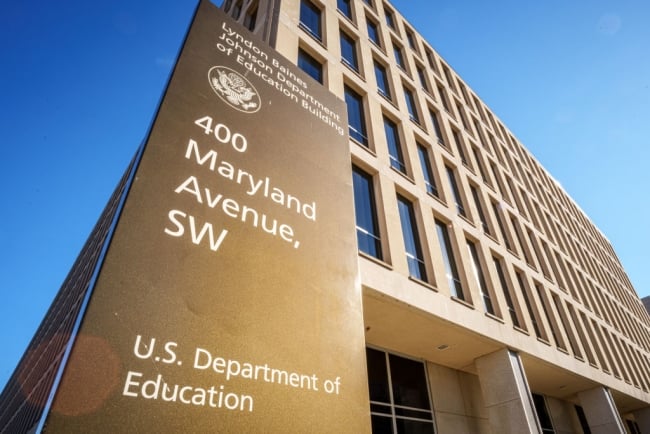You have /5 articles left.
Sign up for a free account or log in.

The proposed budget slashes the Education Department’s funding by 15 percent.
J. David Ake/Getty Images
The Trump administration wants to lower the maximum Pell Grant by $1,685 for the 2026–27 academic year as the program faces an estimated $2.7 billion shortfall.
The proposed cut, detailed in budget documents released Friday evening, would drop the maximum Pell Grant to $5,710, reversing more than a decade of efforts to steadily boost the award, which helps low-income students attend college. The proposed budget keeps overall funding for the Pell Grant level compared with the current budget, adopted in fiscal year 2024.
But the cut to the maximum award is necessary, Trump officials wrote, to address “an untenable shortfall.” In addition to an increase in fraud, the administration blamed Congress for this problem. Over the years, Congress has steadily boosted the maximum award and expanded eligibility for the Pell Grant without putting more money into the program, which historically has run a surplus.
“This chronic mismanagement jeopardizes access to postsecondary education for students and families across the country,” officials wrote in the budget docs. “The President is committed to fulfilling his promise to preserve the Pell Grant program; however, the growing funding shortfall created by past congressional decisions makes it necessary to decrease the maximum award. The administration looks forward to working with Congress to develop a long-term, sustainable solution.”
Republicans in Congress have proposed their own cuts to the Pell Grant, though that same plan also puts $10.5 billion into the program over the next three fiscal years. About 30 percent of students receive the Pell Grant each academic year.
Officials said that the lower maximum will cover the average in-state tuition and fees for community college students; however, some students use Pell Grants to attend more expensive four-year institutions. Over the years, advocates for increasing or doubling the Pell Grant have said the maximum award covers less than a third of the costs of four-year colleges and universities.
In early May, the Trump administration released an outline of its fiscal year 2026 budget. That document, known as the skinny budget, outlined a number of cuts, such as zeroing out TRIO and the federal Supplemental Educational Opportunity Grant. Additionally, the administration proposed slashing $980 million from the Federal Work-Study program.
Trump officials wrote in the more comprehensive budget proposal released Friday that they want to change the formula for work-study to “enact a more appropriate split between Federal and employer wage subsidy, where employers pay 75 percent of a student’s hourly wages and reduce the federal contribution to 25 percent.”
Department officials said Friday that cutting TRIO and other grant programs would save more than $2.13 billion and argued that those programs are either duplicative; better supported with state, local, institutional or private funds; outside of the agency’s mission; or lack evidence providing their effectiveness. (The overall budget plan cuts about $12 billion, or 15.3 percent, from the department.)
Trump officials previously argued that TRIO was a “relic of the past when financial incentives were needed to motivate Institutions of Higher Education (IHEs) to engage with low-income students and increase access.”
Some TRIO Programs Canceled
But the administration doesn’t seem to be waiting for Congress to sign off on its budget cuts.
On Friday afternoon, the Council for Opportunity in Education said in an online post that the Education Department abruptly canceled grants for at least three Upward Bound Projects.
The programs “violate the letter or purpose of Federal civil rights law; conflict with the Department’s policy of prioritizing merit, fairness, and excellence in education; undermine the well-being of the students these programs are intended to help; or constitute an inappropriate use of federal funds,” according to related letters from the Department of Education.
Madi Biedermann, deputy assistant secretary for communications at the Education Department, said in a statement to Inside Higher Ed that the department continued funding for more than 100 TRIO grants last week. She confirmed that three grants were canceled.
“The department will not fund DEI plans or programs that are not furthering merit, fairness, and excellence in education,” she said. “Institutions have the opportunity to ask the department for reconsideration of their applications.”
COE anticipates more action from the Trump administration to come. Advocates have worried for months that the crackdown on programs that support underrepresented groups would eventually reach TRIO, a collection of long-standing programs that help students get to and through college. But the recent cancellations mark the first time TRIO has been directly affected.
“We expect similar cancellations to be issued not only for additional Upward Bound grants but across all TRIO grant programs,” COE president Kimberly Jones wrote in the announcement.
Upward Bound is specifically geared toward high school students who are either low income or would be the first in their families to go to college. COE said that the programs that lost funding were set to start June 1.




